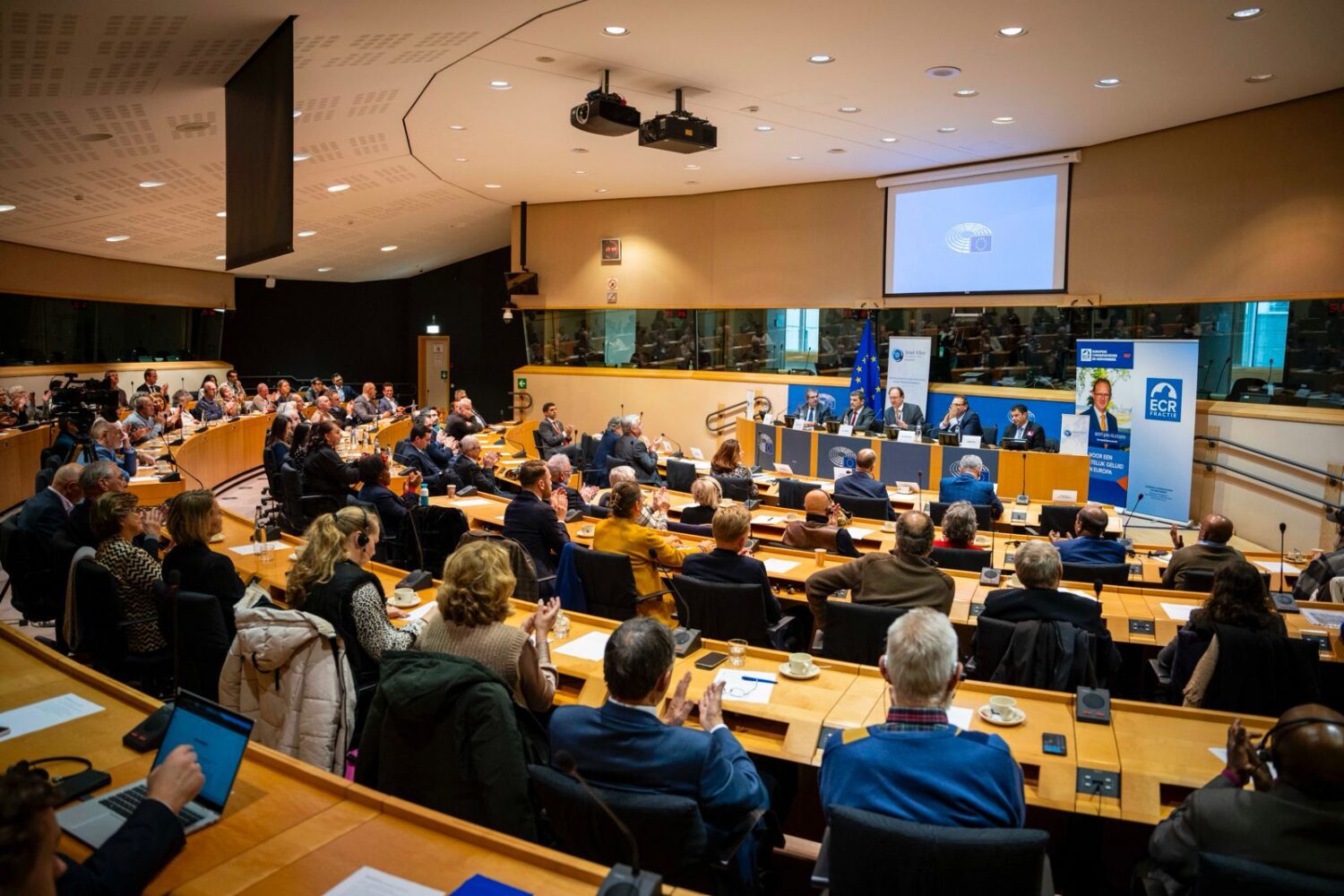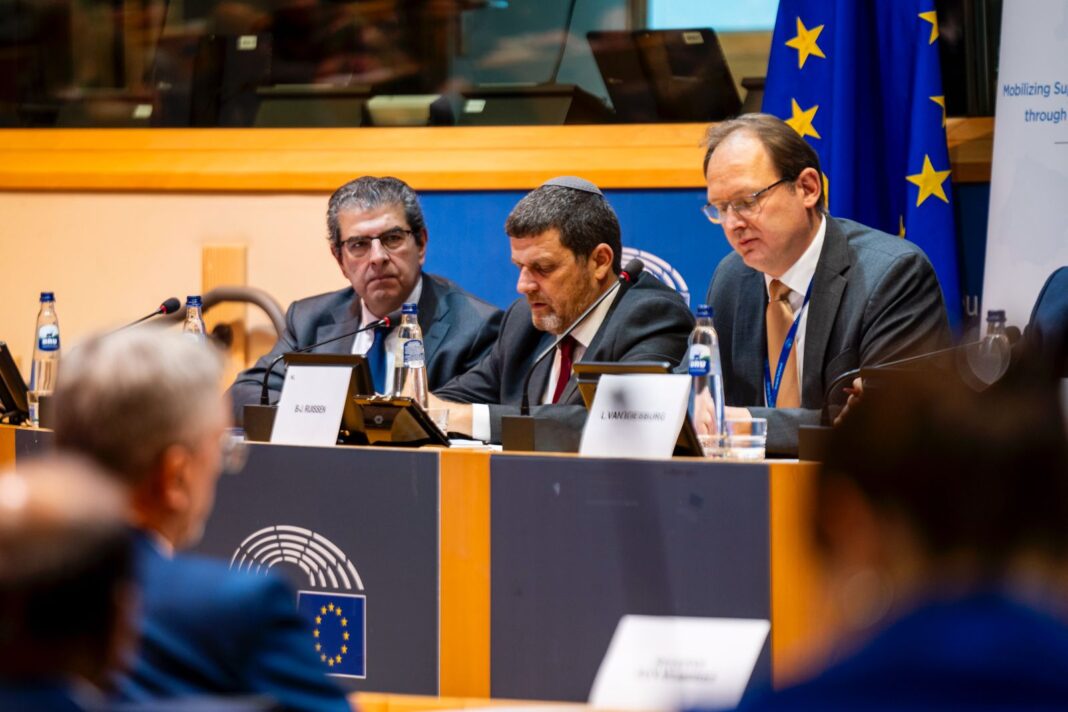“The Islamic Revolutionary Guards Corps (IRGC) should be recognized by the EU as a terrorist group” was the main message of a conference hosted at the European Parliament by MEP Bert-Jan Ruissen on 4 December.
The event titled “The Iranian regime, a risk for the security of Europe and Israel” was attended by about 200 participants and several members of the Parliament.
The IRGC which was designated as a terrorist organization by the U.S. on 15 April 2019 and by Canada under its Criminal Code on 19 June 2014 has an estimated strength of 125,000 soldiers and is tasked with upholding the Iranian regime’s theocratic Islamic system domestically. Its overseas wing, the Quds Force, is also accused of managing Iranian proxies including Hamas in Gaza and Hezbollah in Lebanon.
The New York Times revealed secret documents showing that Iran had known about plans by Hamas to carry out its 7 October 2023 terror attack on Israel, which killed more than 1,200 people, and that Tehran had been supportive of the action. The IRGC has also been accused of leading a brutal crackdown on Iranian protesters, transferring arms to Russia and launching ballistic missiles against Israel, as well as propping up militias all across the Middle East.
As an immediate consequence of this listing, Canadian financial institutions, such as banks and brokerages, are required to immediately freeze the IRGC property. It is also a criminal offence for anyone in Canada and Canadians abroad to knowingly deal with property owned or controlled by the said terrorist group.
Lithuania, the first EU country to recognize the IRGC as a terrorist organization
On 3 October 2024, the Seimas adopted a resolution stating that Iran’s Islamic Revolutionary Guard Corps is a terrorist organisation. Emanuelis Zingeris, Chair of the Committee on Foreign Affairs, noted that its activities pose a threat to international security and stability.
The adopted Resolution condemned Iran’s steadily increasing military support to Russia in its military aggression against Ukraine, as well as the direct drone and missile attacks launched on Israel and its population on 13 April and 1 October. The Seimas also condemned the cooperation of the Islamic Republic of Iran and its ally the Russian with Hamas, Hezbollah, Palestinian Islamic Jihad and Ansar Allah (the Houthis) as well as other terrorist organisations and support provided to them, regardless of their crimes and attacks perpetrated in third countries and international waters.
The Lithuanian Parliament called on the European Union to add the Islamic Revolutionary Guard Corps to the EU terrorist list and on the parliaments of all democratic states to join in recognising the Islamic Revolutionary Guard Corps as a terrorist organisation.
The Resolution thereon was adopted unanimously by 60 votes in favour.
The EU under pressure to recognize the IRGC as a terrorist organization
For some time, there have been repeated calls in the European Parliament to put the IRGC on the EU terrorist list but in vain.

On 19 January 2023, the European Parliament adopted a resolution targeting the IRGC among other Iranian actors.
The Parliament called on the VP/HR Josep Borrell and the EU Council “to expand the EU sanctions list to all individuals and entities responsible for human rights violations and their family members, including Supreme Leader Ali Khamenei, President Ebrahim Raisi, and Prosecutor General Mohammad Jafar Montazeri, as well as all foundations (‘bonyads’) linked to the IRGC, notably the Bonyad Mostazafan and the Bonyad Shahid va Omur-e Janbazan.”
The Parliament also called on the Council and the Member States
“to add the IRGC and its subsidiary forces, including the paramilitary Basij militia and the Quds Force, to the EU terrorist list, and to ban any economic and financial activity involving businesses and commercial activities related to, owned, wholly or in part, by, or fronting for, the IRGC or IRGC-affiliated individuals, regardless of their country of operation, while avoiding any adverse consequences for the people of Iran as well as for EU humanitarian and development aid.”
calls for the EU and its Member States, in cooperation with like-minded partners, to urge any country in which the IRGC deploys military, economic, or informational operations to sever and outlaw ties with the IRGC; strongly condemns the IRGC’s unprovoked attack in the Erbil Governorate of Iraqi Kurdistan and stresses that such indiscriminate attacks threaten innocent civilians and the region’s stability.”
Under current rules, adding a new entity to the EU’s terrorist list requires a decision issued by a judicial body in one of the 27 member states.
The next stage goes through discussions among member states and the final approval requires unanimity, meaning one single capital could block it.
Germany, France and the Netherlands are among the member states who have previously expressed support for the designation. European Commission President Ursula von der Leyen and the European Parliament have also backed the idea.
A call to the EU
In his concluding remarks, MEP Bert-Jan Ruissen called on the EU to put the IRGC on its blacklist of terrorist organizations.
To this end, he recalled that “Iran’s threat to Israel and the wider region is quite obvious for many of us. This became once more clear after the multiple attacks on Israel this year and by the actions through Iran’s network of terrorist proxies in the region. This Iranian threat may further increase in the near future.”
He also stressed that “Throughout the years many Iranian attacks took place on individuals on European soil, be it Jews or members of the Iranian diaspora, also by making use of criminal networks in Europe. This is less visible for the broader public, but it is a big threat for security in Europe.”
He finished by saying:
“I hope this conference has served as an eye-opener to the big risks we are facing, both in Israel and Europe. We need increased cooperation to counter the Iranian threat. Western allies need to stand ready to support Israel in defending itself against the malicious Iranian regime. The EU should list the IRGC as a terrorist organization and the security and intelligence services of the Member States should actively cooperative to track down and eliminate the Iranian threats on their soil.”





